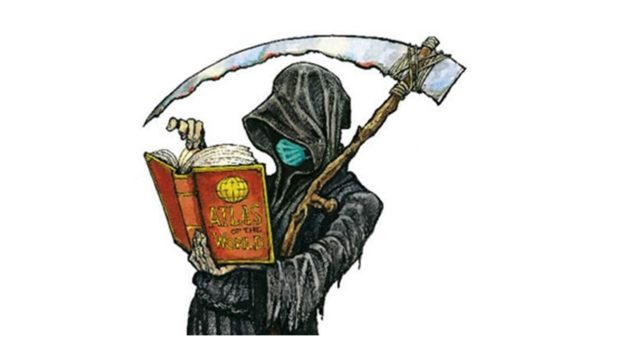In Spring term 2020 (March – June) the timing worked out for me to develop and offer a course on the economics of pandemics. The course material emerged as a combination of the economics and policy scholarship that was emerging in real time, along with a survey of the body of social science and historical scholarship on how the impact of epidemics and pandemics shaped the arc of economic history.
Welcome to Economics 295/495. Thank you for enrolling on such short notice and welcome to the course. The course will provide you with some economic and policy analysis tools germane to understanding disease outbreaks, and also look back on how economists have studied past and on-going epidemics. This particular version of the course is a one-time offering, as I will tailor (some of) the content to keep up with what is going on outside our windows.
I have two principal objectives for the course. The first is to work with you to develop a framework and a mentality for approaching the current crisis as social scientists. This will require us to develop some basic understanding of epidemiological terminology and concepts, as well as the basic architecture of US public policy. And it will require some understanding of micro and macroeconomics.
A second objective is for us to share an appreciation and understanding of the role epidemics and pandemics have shaped the arc of human history. I have on our agenda for us to explore how society has dealt with the Black Death, smallpox, influenza, SARS, malaria, tuberculosis, HIV/AIDS, and on and on. Although your prior might be that the spread of disease is a scientific phenomenon, we will find that human behavior is often decisive in how these things turn out.
As you might imagine, I have not taught a course on the economics of pandemics before, so I am in the process of putting together the readings and materials. We are going to learn a lot about the state of the world over the next ten weeks, so I will be flexible in terms of the content from week to week and what I specifically expect from you.
I expect to evaluate you through weekly writing assignments, periodic quizzes on the material, and a final paper or project (I am keeping this flexible in case something presents itself that you would like to take on as we move through the course). You should expect to do a lot of reading and a fair bit of writing throughout the next ten weeks. The more you can discuss the material and exchange ideas with other students (or with anyone, really), the more you are likely to learn.
Week 1: Externalities, Expectations and (Basic) Epidemiology
Week 2: Did we see this coming? Where is this going? (Preparing for a Pandemic, Thinking about its Consequences)
Week 3: Measuring Benefits and Costs, Roadmaps to Reopening (And what’s with negative oil prices?)
Week 4: The Long Sweep of History (Overview of some nasty infectious diseases and measuring their consequences)
Week 5: The Plague
Week 6: Targeted Policies and The Pox of Liberty (An update from Chicago and MIT and Werner Troesken’s provocative thesis on smallpox)
Week 7: Crisis Policymaking and A Sample of Epidemic Diseases (The Italian Cholera cover up, Tuberculosis, and the 20th-century plague)
Week 8: The Deadliest Virus Ever Known and the US Innovation System (When will the vaccine be ready?)
Week 9: What ‘Letter’ is Your Economic Recovery? and Once-and-Future Global Pandemics (HIV/AIDS, Malaria, along with the Flu and the SARSes)
Suggested Resources
- Daily updates from the Marginal Revolution blog and Marginal Revolution University
- CORE CoVID-19 Collection.
- National Bureau of Economic Research, Economic Analysis Related to the COVID-19 Pandemic
- Facts about CoVID-19 and research from the Becker-Friedman Institute at the University of Chicago
- Federal Reserve Bank of St. Louis, Research on CoVID-19
The Book on CoVID-19
- Joshua Gans, Economics in the Age of COVID-19, MIT Press (open access!)
A Thesis on Infectious Diseases and Economic Growth
- Werner Troesken, The Pox of Liberty: How the Constitution Left Americans Rich, Free, and Prone to Infection. University of Chicago Press, 2015.
Epidemics and Western Society from Professor Frank Snowden
- Frank M. Snowden, Epidemics and Society: From the Black Death to the Present. Yale University Press, 2019,
- Frank M. Snowden, Epidemics in Western Society Since 1600, Open Yale Course, 2009
